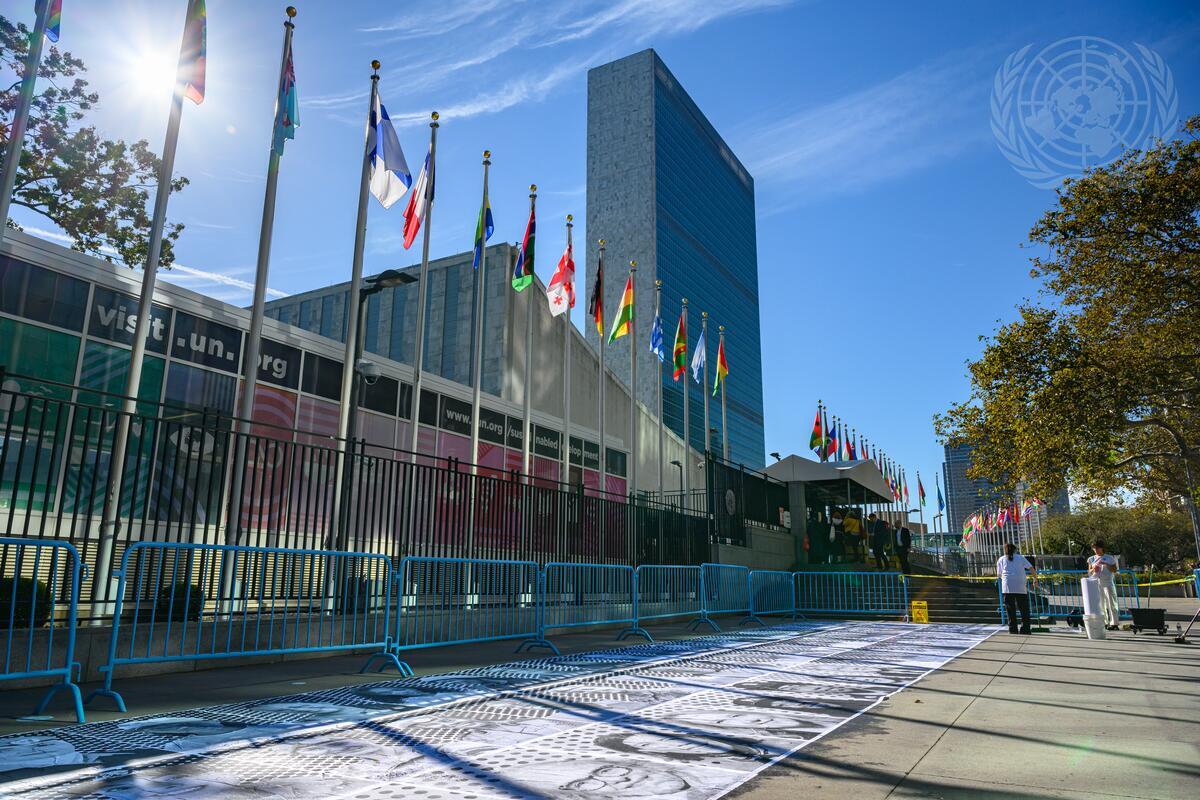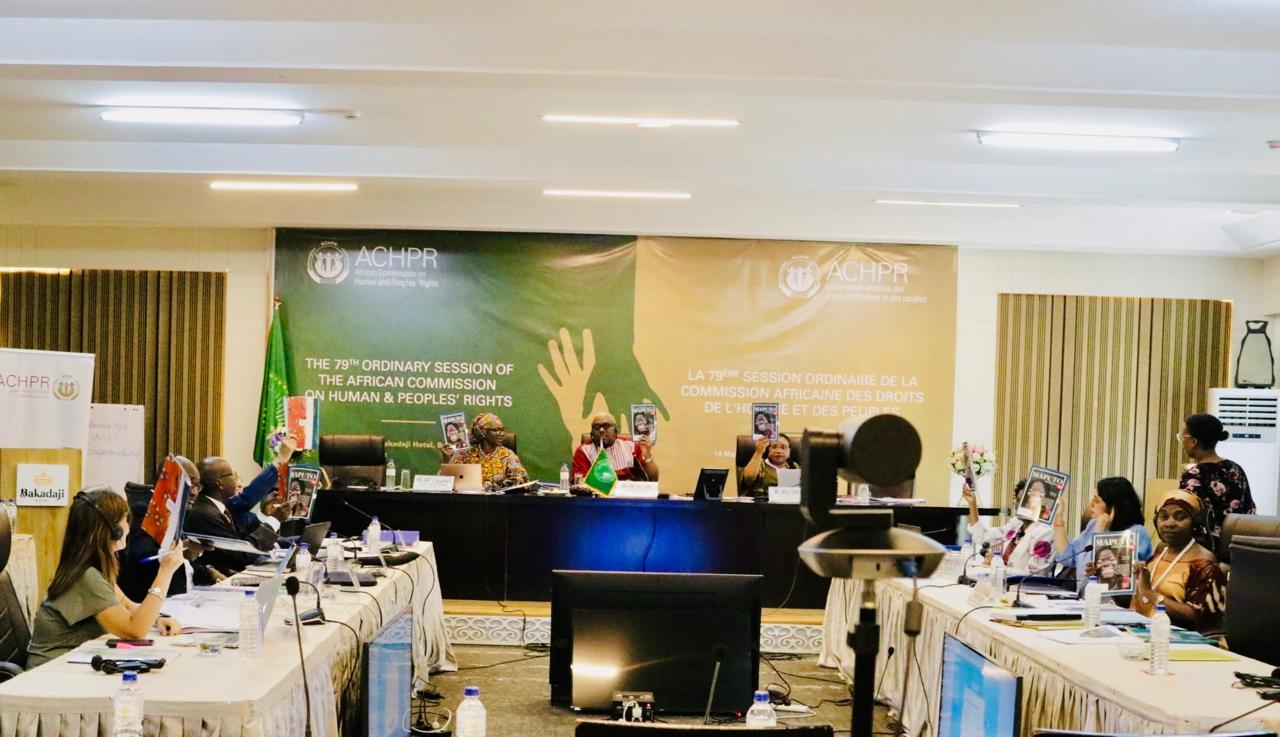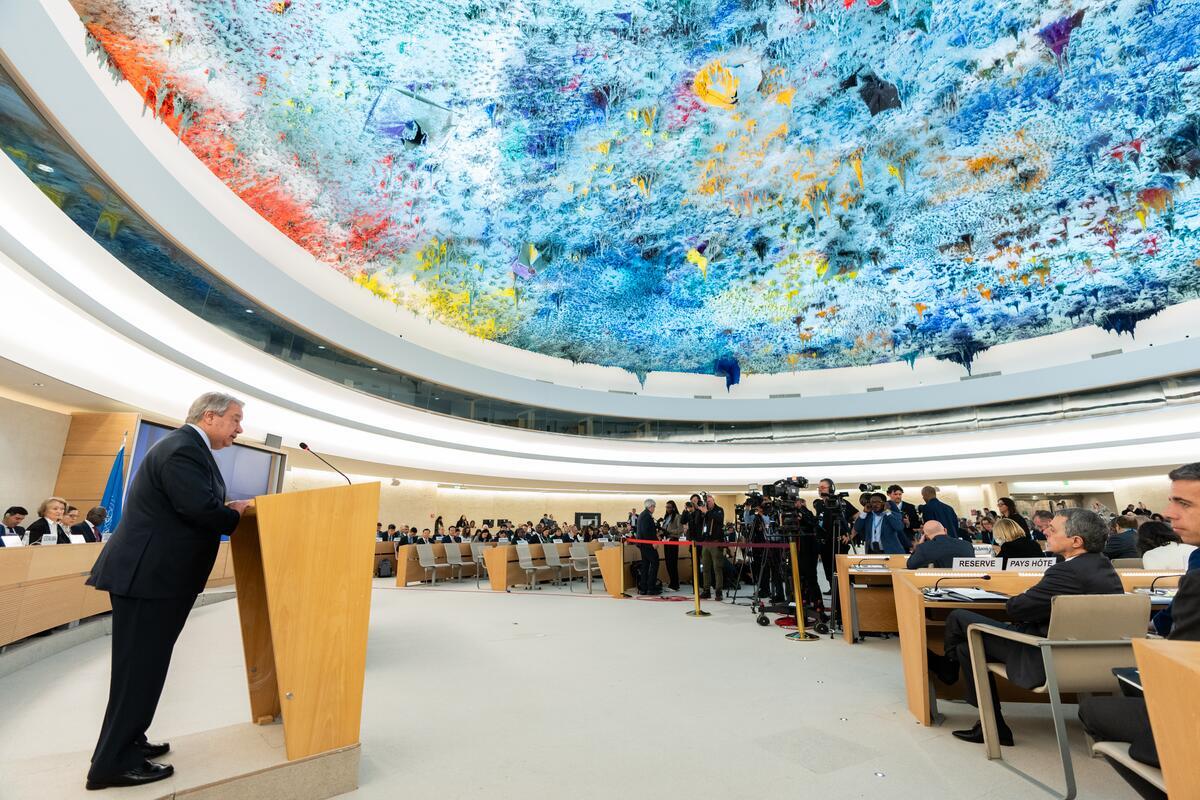Participants attended the session online while the Commissioners and the Secretariat were physically present in Banjul. 805 delegates attended this session. It included 118 State representatives, eight representatives of the African Union (AU) organs, three representatives of Regional Economic Communities, three representatives of UN agencies, 39 representatives of international and intergovernmental organisations and 66 representatives of National Human Rights Institutions. The number of delegates to this session dropped by half as compared to the 77th Ordinary Session held in person in Arusha, United Republic of Tanzania. Alarmingly, the number of participants from non-governmental organisations to this session represents 3,5 per cent of those who attended the in-person session in Arusha. The hybrid modality weakens the ability of civil society organisations to engage among themselves and with the Commission on critical human rights issues. It, in addition, hampers civil society’s advocacy work.
Hannah Forster, speaking on behalf of the Forum of Non-Governmental Organisations positively noted the peaceful transfer of powers in Senegal while lamenting about the situation of Sudan, the Democratic Republic of Congo (DRC) and Chad which remains ‘a course of concern’. For Forster, ‘we should be reminded of the sacrifice made by those on the frontline of justice and human rights and their efforts should inspire us to redouble our efforts for a more peaceful and equitable Africa’. Joseph Withal, on behalf of African National Human Rights Institutions, reiterated their commitment to promote and protect human and peoples’ rights on the continent despite challenges confronting their work. Building on the African Union theme of the year on Education, he said: ‘Investing in education is both a necessity and a strategic imperative for unlocking the full potential of the continent and our people so that people can participate fully in sustainable development’. Djidda Mahamat, the Fourth Vice-President of the Pan-African Parliament echoed a similar sentiment by stating that ‘we cannot aspire to economic and other development without ensuring that the rights inherent in the human person are respected’. The cooperation between the Commission and the African Court on Human and Peoples’ Rights was the central theme of Judge Modibo Sacko’s statement. He indicated that several litigants were waiting for their cases to be transferred to the Court from the Commission while highlighting the need to render effective the complementarity between the two African Union human rights bodies. The Commission’s Chairperson, Commissioner Rémy N. Lumbu averred that ‘the guns have not been silenced in almost all Africa’. ‘Security problems arise in Ethiopia, the Sahel, eastern Sudan, Somalia, eastern DRC where the M23 rebel group supported by foreign governments operates, the far north of Cameroon’, he said. He raised his concern to the lifting of the Moratorium on the death penalty in the DRC which is a step backwards against article 4 of the African Charter on Human and Peoples’ Rights, restrictions on freedom of association and assembly, reprisals against human rights defenders and prison overcrowding, among others.
Panel discussions
The Commission held nine panels on various themes. The Panel on the Declaration on the Promotion of the Role of Human Rights Defenders and their Protection in Africa aimed to provide another opportunity for key stakeholders – States, civil society organisations, and national human rights institutions- to give input to the ‘zero draft’. Panelists suggested aspects that the African Commission should include or clarify in the draft Declaration to address emerging threats to the work of human rights defenders. These aspects include the need to adopt an intersectional perspective and address the plights of defenders in areas of vulnerability such as women human rights defenders, defenders with disabilities, defenders working on the rights of sexual minorities, those fighting corruption, defending environmental and natural resources, climate change and justice and those demanding for corporate social accountability. The Panel on the commemoration of the 30th anniversary of the Rwandan genocide reviewed the strides the continent has made to prevent the occurrence of similar atrocities and how the African human rights system could better respond. Panellists on the submission of State reports noted the low level of reporting as not all the States submit their initial or periodic report to the African Commission. For instance, only Cameroon among 33 State parties has submitted its report on measures it has adopted to realise the rights guaranteed by the Kampala Convention. Regarding the Maputo Protocol, only 21 States have submitted their reports while 24 have not. In his opening remarks, Commissioner Hatem Essaiem lamented States’ poor commitment to their obligation to report given that 50 per cent of member States to the Charter have a minimum of three delayed reports and six have never reported on measures adopted under Article 62 of the African Charter.
Activity reports of Commissioners
Members of the Commission presented their inter-session reports highlighting the activities undertaken in their capacity as Commissioners, country rapporteurs and mandate holders of special mechanisms. ISHR made three statements (see here, here and here) following reports by the Special Rapporteur on Human Rights Defenders and Focal Point on Reprisals, the Special Rapporteur on the Rights of Women in Africa and the Chairperson of the Working Group on Extractive Industries, Environment, Human Rights Violations in Africa. In his report, Commissioner Lumbu indicated he conducted, in November 2023, with the support of ISHR, an advocacy visit for the adoption of a human rights defenders’ law in Senegal and recommended that similar efforts be made in other countries deprived of human rights defenders laws. In response to the Special Rapporteur’s Report, ISHR highlighted the need for the Focal Point to publish his long overdue report and to tackle restrictive civic space laws across the continent. The report of the Special Rapporteur on Women highlighted issues that have arisen facing women in the continent. For example, the rise of feminicide cases as well as retrogressive trends in democracy that have occurred such as fewer elective positions for women in Zimbabwe and the attempt to reverse the law on Female Genital Mutilation in The Gambia. The report also noted and expressed concern about a rise in sexual violence especially in conflict-prone areas. In a joint statement, ISHR and its partners underscored the need for an immediate ceasefire in Sudan citing that this conflict has caused the largest displacement crisis in the world. Moreover, this has caused humanitarian and human rights crises that particularly affect women human rights defenders. In a statement following the presentation of the report of the Working Group on Extractive Industries, Environment and Human Rights Violations, ISHR shed light on the impacts that extractive industries have on the environment and the surrounding populations – especially Indigenous peoples and women. The report of the Working Group highlighted the importance of social movements and activists, who are often on the frontlines in protecting the environment and human rights where extractive industries are involved.
State review
The delegation of Mozambique presented the periodic report (2015-2021) under Article 62 of the African Charter. While every Commissioner commented on the report and asked questions related to the realisation of key rights that follow under their special mechanism, the Commission called on Mozambique to submit a report on the implementation of the Maputo Protocol and the Kampala Convention and to make a declaration under Article 34(6) of the African Court’s Protocol so that individuals and NGOs with observer status with the Commission can access the Court directly. The Commission finally called on Mozambique to invite it to conduct an official visit to the country.
Observer and affiliate statuses
During the session, the African Commission granted observer status to 10 NGOs and affiliate status to two national human rights institutions (NHRIs): the National Mechanism for the Prevention of Torture of Mauritania and the National Gender and Equality Commission of Kenya. Currently, 571 NGOs enjoy observer status with the Commission while 38 NHRIs are affiliated to the Commission. ‘Granting of affiliate status to NHRIs allows the institutions to be invited to sessions and participate in issues of interest. However, they must also comply by sending reports every two years. I encourage both NGOs and NHRIs to send their reports promptly’, said Commissioner Mudford Mwandenga.
Country and thematic resolutions
The Commission adopted one country-specific Resolution on the human rights situation in the Republic of Sudan. It further adopted three thematic resolutions:
Resolution on the Development of an Addendum on Data to the State Party Reporting Guidelines for Economic, Social and Cultural Rights in the African Charter on Human and Peoples’ Rights (Tunis Reporting Guidelines);
Resolution on the preparation of the General Comment on the right to development in Africa;
Resolution on the Substitution of Vice-Chairperson of the Working Group on Economic, Social and Cultural Rights in Africa.
Next session
In its Final Communiqué, the Commission indicated it will hold the 80th Ordinary Session from 24 July to 2 August 2024 and promised to provide details later on its website.




